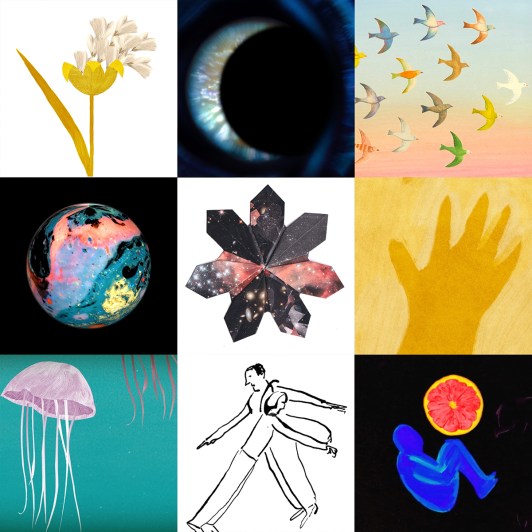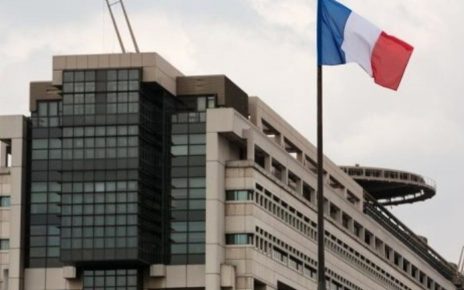A song of praise for life and “the smallest possible once before once.”
This is the fifth of nine installments in the 2021/2022 animated season of The Universe in Verse in collaboration with On Being, celebrating the wonder of reality through stories of science winged with poetry. See the rest here.
THE ANIMATED UNIVERSE IN VERSE: CHAPTER FIVE
Whenever I am down, I think of the gladiolus.
Whenever I ache with self-referential humanity — that evolutionary miracle of complex consciousness that endows us with the capacity for reflection and rumination at the root of all sorrow — I think of the gladiolus and its primal scream of color and its two-hundred-million-year triumph, governed by insentient forces stretching back to the Big Bang that bloomed a something out of the unimaginable nothingness.
I think of the gladiolus with its mohawk of blossoms — one-sided, bisexual, belonging to nature’s nonbinary citizenry: the “perfect flowers” — most of its 300 known species native to Africa, to which we too are native. A fierce beauty named after the Latin word for sword, known sometimes as “sword lily,” linking it to the flower for which my mother was named. A blade of blossoms pollinated by tiny wasps and long-tongued bees and hawk-moths, and then by self-conscious sapiens with opposable thumbs — a chainlink of humans holding hands across the epochs from Mendel to the young Puerto Rican woman at the Manhattan flower market, those generations of horticulturalists who hybridized and cultivated the small iridescent blossoms of the wild flower to make the towering blooms of solid red and white and yellow in my Bulgarian grandmother’s garden, on my Bulgarian grandfather’s coffin.
Gladiolus by Sydenham Teast Edwards from William Curtis’s Botanical Magazine, 1790. (Available as a print and as stationery cards, benefitting The Nature Conservancy.)
I think of the gladiolus, with which we share 98% of our DNA — that delicate arrangement of atoms forged long ago when all of them, yours and mine and the sword lily’s, banged into being 13.8 billion years ago from a single source, no larger than the dot levitating over the small i, the I lowered from the pedestal of ego.
The young poet Marissa Davis celebrates the atomic spirituality in this chainlink of kinship between us and everything alive in “Singularity (after Marie Howe)” — a poem inspired by “Singularity” (after Stephen Hawking),” which the gifted and golden-souled Marie Howe composed for and premiered at the second annual Universe in Verse in 2018, commemorating the recently stardust-surrendered scientist who revolutionized our understanding of the universe by illuminating what happens to a dying star as it collapses to form a singularity — the tiny point of zero radius, infinite density, and infinite curvature of spacetime at the bottom of a black hole, kindred to the Big Bang singularity at the bottom of the Beginning — that original seed from which the universe bloomed.
Marie’s “Singularity” — which was transformed into a breathtaking animated film for the lockdown livestream of the 2020 show, a film that inspired this experimental literary-animated “season” of The Universe in Verse in the interlude between live gatherings — radiated across our Pale Blue Dot, eventually reaching Marissa to spark her own “Singularity” — an exquisite ode to our primeval bond with one another and the rest of nature.
For this fifth installment in the interlude series, in an homage to the intergenerational chainlink of inspiration from which all art is born, here is Marissa’s “Singularity” animated into vibrant aliveness by English artist Lottie Kingslake and set to song by the cosmic life-force that is Toshi Reagon.
SINGULARITY
by Marissa Davis
(after Marie Howe)
in the wordless beginning
iguana & myrrh
magma & reef ghost moth
& the cordyceps tickling its nerves
& cedar & archipelago & anemone
dodo bird & cardinal waiting for its red
ocean salt & crude oil now black
muck now most naïve fumbling plankton
every egg clutched in the copycat soft
of me unwomaned unraced
unsexed as the ecstatic prokaryote
that would rage my uncle’s blood
or the bacterium that will widow
your eldest daughter’s eldest son
my uncle, her son our mammoth sun
& her uncountable siblings & dust mite & peat
apatosaurus & nile river
& maple green & nude & chill-blushed &
yeasty keratined bug-gutted i & you
spleen & femur seven-year refreshed
seven-year shedding & taking & being this dust
& my children & your children
& their children & the children
of the black bears & gladiolus & pink florida grapefruit
here not allied but the same perpetual breath
held fast to each other as each other’s own skin
cold-dormant & rotting & birthing & being born
in the olympus of the smallest
possible once before once
Previously on The Universe in Verse: Chapter 1 (the evolution of life and the birth of ecology, with Joan As Police Woman and Emily Dickinson); Chapter 2 (Henrietta Leavitt, Edwin Hubble, and the human hunger to know the cosmos, with Tracy K. Smith); Chapter 3 (trailblazing astronomer Maria Mitchell and the poetry of the cosmic perspective, with David Byrne and Pattiann Rogers); Chapter 4 (dark matter and the mystery of our mortal stardust, with Patti Smith and Rebecca Elson).
donating = loving
For a decade and half, I have been spending hundreds of hours and thousands of dollars each month composing The Marginalian (which bore the unbearable name Brain Pickings for its first fifteen years). It has remained free and ad-free and alive thanks to patronage from readers. I have no staff, no interns, no assistant — a thoroughly one-woman labor of love that is also my life and my livelihood. If this labor makes your own life more livable in any way, please consider lending a helping hand with a donation. Your support makes all the difference.
newsletter
The Marginalian has a free weekly newsletter. It comes out on Sundays and offers the week’s most inspiring reading. Here’s what to expect. Like? Sign up.





